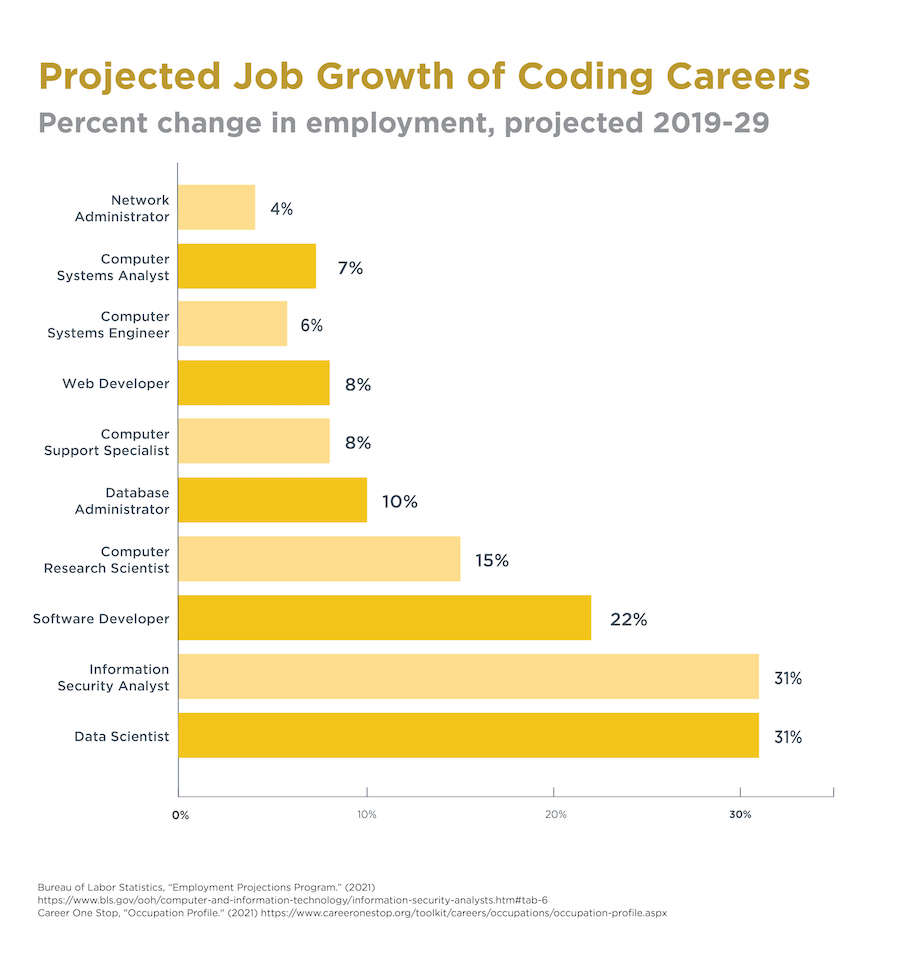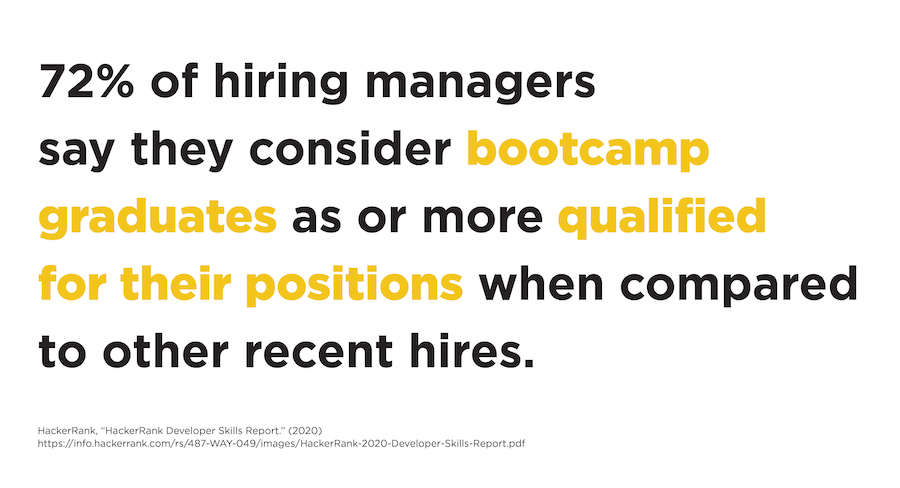10 In-Demand Coding Careers & How Beginners Can Get Started

Computer coders have become a key part of countless industries — they help create and maintain the digital devices and software that make the working world smarter, faster, and safer. As a result, career opportunities in this space have become abundant, offering creative paths filled with potential for growth, fulfillment, and competitive compensation.
In this article, we will introduce several top coding careers for beginners, including their salary information and basic responsibilities. We will also explore how to start a career in coding, including educational options like coding bootcamps, which are an ideal pathway for aspiring coders to learn industry fundamentals quickly and flexibly.
Read on for a closer look at these 10 in-demand coding careers:
- Web Developer
- Software Developer
- Information Security Analyst
- Computer Systems Analyst
- Database Administrator
- Computer Systems Engineer
- Network Administrator
- Computer Support Specialist
- Data Scientist
- Computer Research Scientist
1. Web Developer
Web developers design and maintain websites, constructing them to operate quickly and intuitively. Developers work in tandem with clients and designers to determine a site’s primary needs and goals, using this information to create better interfaces and reflect user demand. Generally, this process hinges on strong programming skills — particularly in versatile, development-oriented languages like JavaScript, HTML, CSS, and Python.
Some common web development positions include front end developers (those who create and maintain a site’s user-facing elements), back end developers (those who work with a site’s underlying digital framework), and full stack developers (those who work on both a site’s front and back ends).
Web Developer Salaries and Job Outlook
According to the U.S. Bureau of Labor Statistics (BLS), web developers earned a median annual salary of $77,200 in 2020, while those in fields such as publishing can make more than $120,000. Developer job growth is expected to continue at a rapid rate — the BLS projects 8 percent employment growth for the industry through 2029 — particularly as online retail continues to rise in prominence.
[2U to insert form]
2. Software Developer
Software development is among the fastest-growing jobs in technology. Developers help create the programs and applications that we use daily, and this process hinges on programming skills since code makes up the framework of any digital entity. Developers must also garner and analyze user needs to make more informed decisions when designing, building, and testing new software. Developers may work with computer software, mobile applications, or operating systems (among other mediums).
Software Developer Salaries and Job Outlook
Software developers earned a median annual salary of $110,140 in 2020, according to the BLS, while the median salary for developers in the Orlando area is $94,980, as reported by CareerOneStop. Paired with the industry’s 22 percent projected job growth by 2029, these figures position software development as a promising coding career path for years to come.
3. Information Security Analyst
Information security is a common concern for any business with a digital presence. According to the FBI’s 2020 Internet Crime Report, there were nearly 800,000 cybercrime complaints in 2020, with reported losses of more than $4 billion attributed to such attacks.
Information security analysts help keep companies and their sensitive data safe. They install firewalls, develop encryption methods, and test computer security systems to prevent breaches. When breaches do occur, analysts respond by assessing damage and developing a response. Further, analysts may also maintain employee security standards, such as teaching best practices for protecting company information and selecting passwords.
Information Security Analyst Salaries and Job Outlook
As a result of their growing demand, information security analysts are competitively compensated; their median annual salary nationally is $103,590, according to BLS data, and $98,800 in the Orlando area (according to CareerOneStop). Additionally, information security is among the fastest-growing careers in technology, with job opportunities projected to increase by 31 percent through 2029.
4. Computer Systems Analyst
Computer systems analysts study an organization’s computer network to ensure that it fulfills its intended purpose. The role requires both coding experience and business expertise. It’s not usually a role for beginners, though professionals with business experience and IT knowledge can make the transition.
According to the BLS, the job combines business and information technology, meaning that computer systems analysts must understand both. Systems analysts often work on the hardware side of computing: upgrading, enhancing, and troubleshooting equipment. Other job requirements, according to the BLS, include designing new systems, researching emerging technology to determine whether a system is efficient, conducting cost analysis to assess whether upgrades are feasible or worthwhile, and testing systems to make sure they work properly.
Computer Systems Analyst Salaries and Job Outlook
The national median annual wage for computer systems analysts is $93,730, according to the BLS, and $86,540 in the Orlando area, according to CareerOneStop. Some analysts can make more than $150,000, the BLS reports. The need for more IT professionals also means promising job opportunities; the BLS projects 7 percent growth for computer systems analysts through 2029.
5. Database Administrator
Database administrators work with large sets of data and their storage units, making sure the data is safe and organized properly. Administrators use specific software products and role-specific programming languages (Python and SQL among them) to keep their databases current and secure. They also help data analysts and company leaders access the data they need to perform evaluations and make business decisions.
Other job responsibilities for database administrators, according to the BLS, include backing up and restoring lost data, ensuring databases are functioning properly, and merging or replacing them.
Database Administrator Salaries and Job Outlook
The BLS projects database administration job opportunities to grow by 10 percent through 2029 — partly because, the BLS states, companies are having difficulty finding qualified workers. Third-party database services are growing in popularity to meet these needs as well. The median salary for database administrators nationally is $98,860, according to the BLS, and $95,270 in the Orlando area, according to CareerOneStop.
6. Computer Systems Engineer
Computer systems engineers determine the scale of a company’s system and the right hardware and software needed to run it. They play an important role in building and testing computer systems to make sure they meet a company’s operational and security needs. Systems engineers also devise new methods for using computers and other devices to meet a particular company’s requirements.
Typical daily responsibilities for a computer systems engineer can include managing and monitoring a company’s computer systems, installing and troubleshooting operating systems, and ensuring that systems are operating properly. Systems engineers should also be familiar with how to install and use security protocols to protect the organization’s computer systems.
Computer Systems Engineer Salaries and Job Outlook
CareerOnesSop reports a national median salary of $92,870 for systems engineers. In the Orlando area, the median salary is a bit lower at $67,310. Broadly speaking, however, engineering job prospects are strong — CareerOneStop projects a 6 percent employment growth for the industry by 2029.
7. Network Administrator
Network and computer systems administrators work to meet the day-to-day requirements of a company’s operations. They make sure their company’s computer and network systems are current, efficient, and secure. Administrators install and maintain hardware and software, perform upgrades and repairs, evaluate and optimize network performance, and manage email and data servers. Companies generally have continued to invest in digital infrastructure, making network administrators key hiring prospects in many industries.
Network Administrator Salaries and Job Outlook
Salary and job opportunities are generally favorable for network administrators. The industry’s national median salary sits at $84,810 (according to the BLS), and at a comparable $82,260 in the Orlando area (according to CareerOneStop). The field is expected to grow by 4 percent through 2029, matching the national average for all industry occupations.
8. Computer Support Specialist
Broadly speaking, computer support specialists are high-level troubleshooters. They assist administrators and managers in testing and evaluating networks to make sure they operate properly. Support specialists also work with users to diagnose and fix issues with hardware, software, and applications. Companies typically employ support specialists in-house to help customers and internal staff with various technical issues. Coding skills aren’t required for this position, though computer knowledge is helpful when troubleshooting issues. This role can also serve as a launchpad for those interested in a computer career and who want to advance by learning how to code.
Computer Support Specialist Salaries and Job Outlook
Computer support specialists make a median annual salary of $65,450 nationally, according to the BLS, and $53,690 in the Orlando area, according to CareerOneStop. The BLS also projects an industry employment growth rate of 8 percent by 2029.
9. Data Scientist
Data scientists combine statistics, math, programming, and communication skills to help companies derive insights from and make decisions based on their data. To accomplish this, data scientists develop ways to collect, organize, and store data so it’s easier to model. They identify problems to address, determine the proper data to address them, create models to identify patterns and trends, and interpret the results. Data scientists must also be skilled in presenting their conclusions in visually smart and appealing ways.
Data scientists generally have strong coding skills, particularly in working with databases and automating processes to run analytical models. They also know how to communicate the results of their models in non-technical terms.
Are you interested in data science? With UCF Data Analytics and Visualization Boot Camp you may be qualified for an entry-level data science role in only 24 weeks.
Data Scientist Salaries and Job Outlook
The national median annual salary for data scientists is $98,230, while the Orlando area records a median salary of $64,880. Meanwhile, broad industry employment opportunities are projected to soar (up 31 percent by 2029, per CareerOneStop) in part because of the growing emphasis on cybersecurity and increasing demand for new software, according to the BLS.
10. Computer and Information Research Scientist
Computer and information research scientists investigate and design new ways to use technology. They might design a new computer system, create a new iteration of mobile technology, or develop new languages and operating systems. The work of research scientists is important in business, science, and medicine, and it helps shape the way we use technology. Coding skills are consistently useful in this role’s development- and modification-based tasks, and they can reinforce suggested models and theories from a high-level technical standpoint, justifying their intended functionality and painting a clearer picture for other involved departments. Such skills will likely become even more important as the industry grows to implement artificial intelligence (AI) and machine learning (ML).
According to the BLS, the daily responsibilities of a computer and information research scientist include: determining an organization’s computing needs and system requirements to meet them; developing new computer systems, operating languages, and software; and exploring the broader issues of computing and generating solutions.
Computer Research Scientist Salaries and Job Outlook
The national median salary is $126,830, according to BLS, and reaches higher in software and computer systems design. In the Orlando area, the median salary is $101,370, according to CareerOneStop — and because many businesses are constantly searching for new, more efficient technology, computer research scientists are in-demand; the BLS projects an industry job growth of 15 percent through 2029.

Is Coding a Good Career?
Coding careers are booming for dedicated, inquisitive professionals interested in high-level problem solving, web design, and layered data analysis. The BLS projects computer-related occupations to grow by 11.5 percent this decade — nearly three times the national average for all occupations. Specifically, artificial intelligence, robotics, and the growing demand for internet-connected products drive this demand for computing experts.
Coding is a foundational discipline for all these occupations, as professionals are needed to write programs that, for instance, operate autonomous vehicles and help secure the internet-connected devices in our homes.
Educational Options for Coding Careers
Wondering how to start a career in coding without any prior experience? You have options, each with its own timetables and requirements. Let’s cover them in more detail.
College Degrees
We’ve shown statistics that underscore the value of bachelor’s and master’s degrees to many coding professions. In addition, a 2020 Stack Overflow survey found that about 75 percent of developers have at least a bachelor’s degree and about 25 percent have a postgraduate degree.
Obtaining at least a bachelor’s degree (in specializations such as computer science, computer programming, or information technology) remains a leading method of learning coding and the related skills required in various computer fields. College students can also benefit from placement resources and industry relationships offered through their institutions. Time and cost, of course, are two primary considerations for students considering a traditional college degree.
Self-Taught Options
Self-study also can be a viable option, particularly for people who want to learn a certain language or study a specific discipline such as web development or cybersecurity. Eager students can learn plenty through online guides and tutorials, and many free or low-cost coding classes are also available online. Not to mention, how-to videos can offer opportunities to learn a programming language for the price of an internet connection.
Self-study can be time-friendly, low-cost, and rewarding to those students able to apply themselves to consistent learning. However, students also must take time and care sifting through the variety and potential repetition of instruction available online. Sourcing good information is one of the key elements of a self-study program.
Coding Bootcamps
Those who want a structured curriculum with smaller time and financial commitments should consider a coding bootcamp, which teaches the specialized skills needed to begin a computing career. Students have access to a flexible online learning environment, instructor support, and career services, which combine to form a complete educational experience.
UCF Coding Boot Camp, for instance, offers 12- and 24-week programs that teach the most in-demand skills of web development: key languages such as HTML and JavaScript, creating and updating web pages, working with databases, and more.
Bootcamp students also develop resume-building portfolios and receive career assistance, which can make a difference in the hiring process. Bootcamp graduates are also making their mark in tech. According to HackerRank, 72 percent of hiring managers say they consider bootcamp graduates as or more qualified for their positions when compared to other recent hires.

Ready to start your coding career? Check out UCF Coding Boot Camp.

